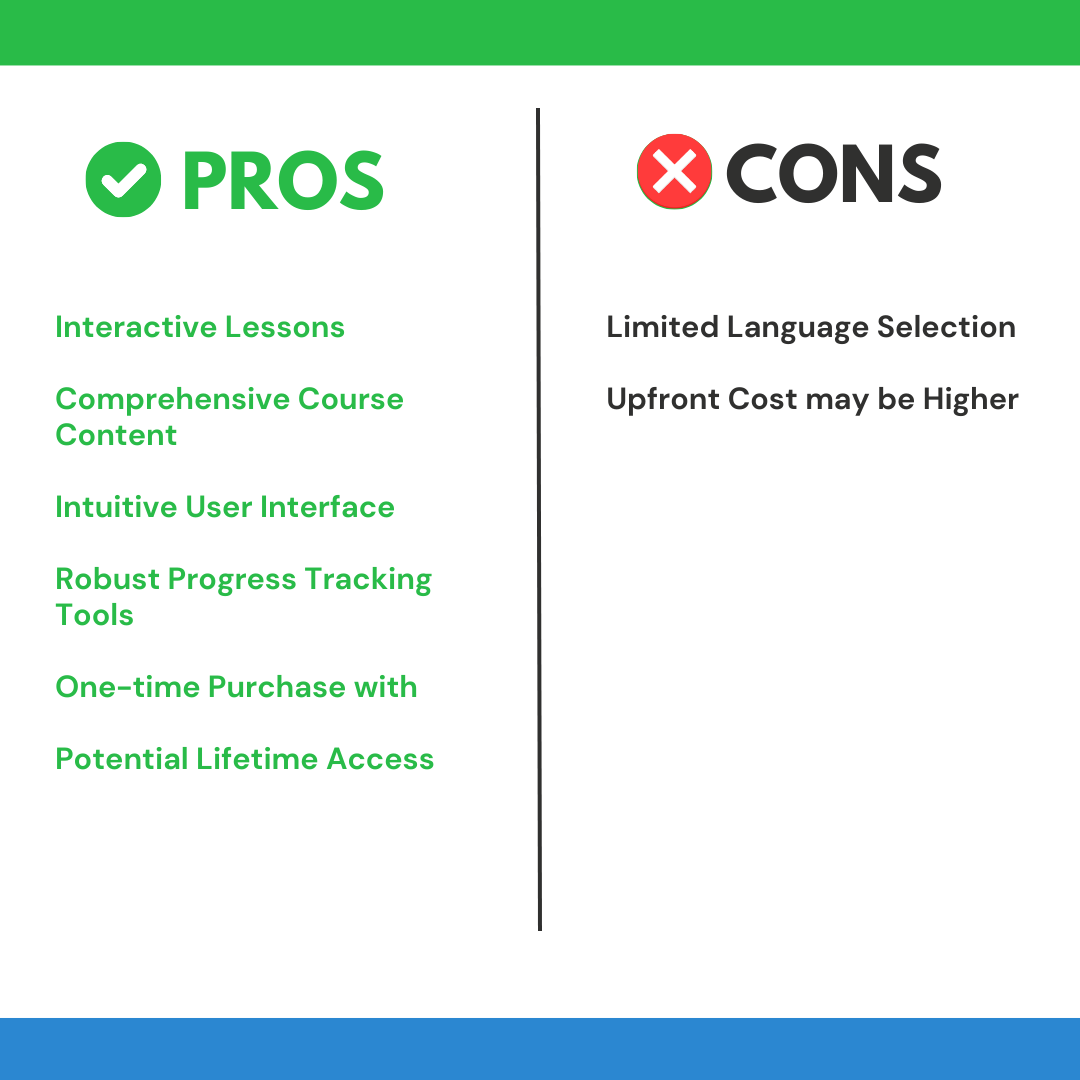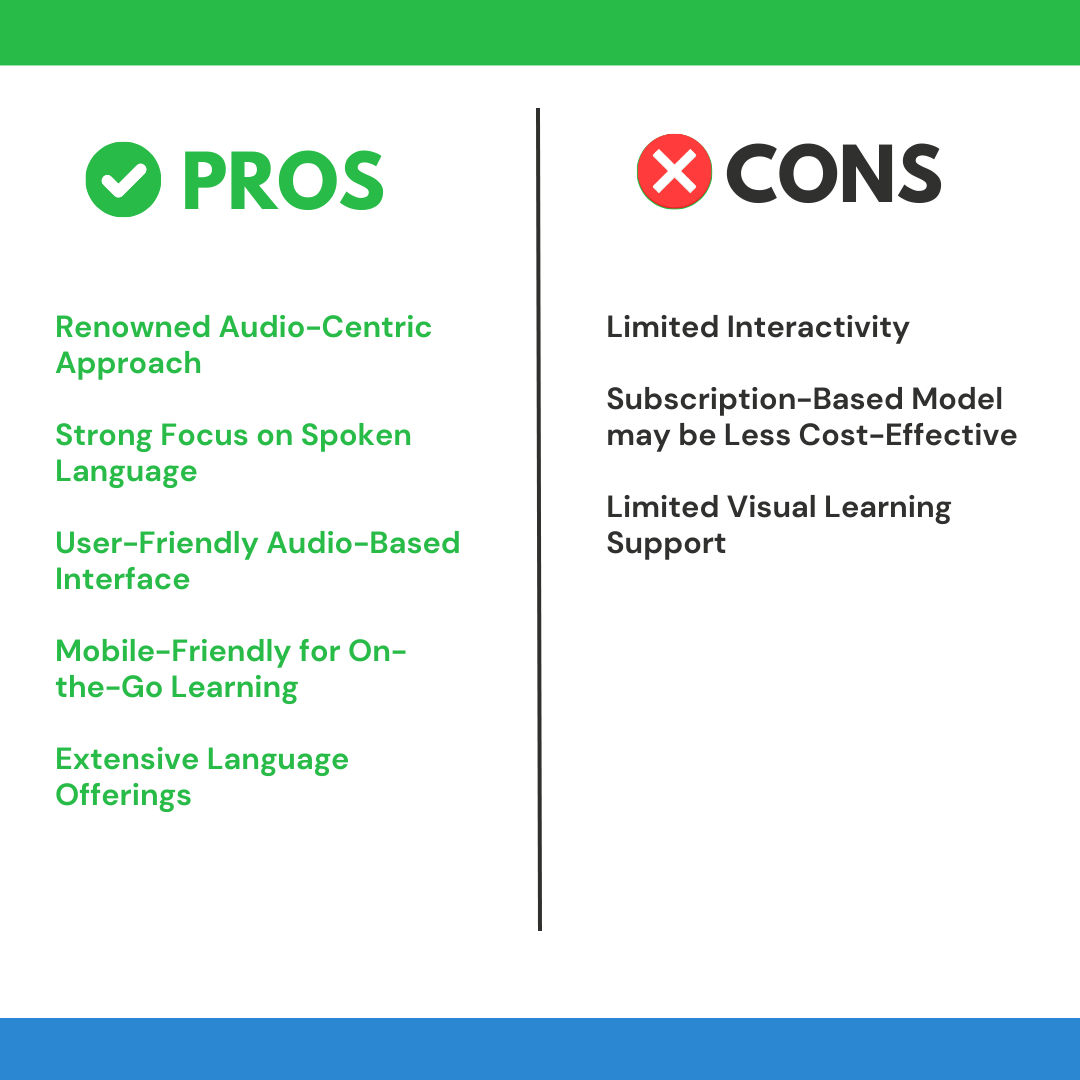
Rocket Languages and Pimsleur are popular language-learning apps that emphasize guided audio lessons and conversational speaking practice. Both apps offer interactive audio lessons that focus on helping learners become conversational as quickly as possible.
Rocket Languages is often praised for its comprehensive curriculum, accurate speech recognition technology, and insightful grammar explanations. On the other hand, Pimsleur is known for its structured lesson plan and excellent voice recognition system. While both programs are highly regarded, Rocket Languages is often considered more well-rounded, offering more resources, a diverse approach to learning, and greater flexibility, contributing to its popularity as a language learning app.
This article will comprehensively compare these two platforms, Rocket Languages vs Pimsleur, to help readers make an informed decision tailored to their language learning preferences. We will assess teaching methodology, course content, user interface, accessibility, and cost-effectiveness. Let’s get to it.
These tables provide a quick overview of the strengths and weaknesses of each language-learning app. Use these lists to evaluate which features are most important to them based on their individual learning preferences and goals.
Rocket Languages stands out in the language learning landscape with its interactive lessons, comprehensive content, and user-friendly interface. While it offers engaging features and robust progress tracking, potential learners should be aware of certain limitations, including a more upfront cost compared to subscription models and a language selection that, while covering popular choices, may not be as extensive as some competitors.

Pimsleur's audio-centric approach distinguishes it in the language learning sphere, strongly emphasizing spoken language skills. Its strengths lie in simplicity, accessibility, and a focus on oral proficiency. However, users should consider potential drawbacks, such as limited interactivity, a subscription-based model, and the need for supplemental materials for visual learners who benefit from written content.

Pimsleur offers courses in 51 languages, including not-so-popular languages like Vietnamese, Finnish, and Ukrainian, and variations of popular languages like Castilian, Spanish, and English for speakers of different nationalities.
On the other hand, Rocket Languages offers courses in 12 languages, which are primarily popular languages. However, it does not provide courses for not-so-popular languages or language variations
While Rocket Languages is known for its comprehensive curriculum and accurate speech recognition technology, Pimsleur's extensive language selection and focus on not-so-popular languages give it an edge in terms of variety and demand
Rocket Languages, and Pimsleur offer different user experiences regarding ease of use, interface design, personalization, goal setting, and gamification.
In terms of gamification and motivation, both apps focus on guided audio lessons with an emphasis on conversational speaking and practice. However, the available sources do not discuss specific details about gamification elements. Therefore, it's recommended to explore the apps directly to assess their gamification features and how they contribute to user motivation

Rocket Languages offers a more balanced approach with various interactive activities, including writing and reading, while Pimsleur's strength lies in its audio-centric methodology, prioritizing speaking and listening skills.

This comparison table provides a detailed overview of the key aspects of pricing, features, and access options for Rocket Languages and Pimsleur. Users can use this information to make an informed decision based on their preferences and budget:
| Comparison Factor | Rocket Languages | Pimsleur |
| Free Trial Availability | Yes, there is limited access to a few modules at each level. | Yes, full access to all features for seven days. |
| Free Version Features | Trial access to introductory lessons. | Full access to all features during the trial period. |
| Paid Version Features | Full access to all resources and features. | Full access to all resources and features. |
| Subscription Model | One-time purchase with potential lifetime access, no subscription model. | Monthly subscription plans: - Pimsleur Premium: $19.95/month - All-Access Plan: $20.95/month. |
| Lifetime Access Options | Yes, through a one-time purchase with lifetime plans ranging from $149 to $449. | Yes, lifetime access options available: - First level: $150 - Two levels: $300 - All five levels: $575. |
| Discounts and Deals | Regularly offers deals and discounts, with a 60-day money-back guarantee. | Pricing for lifetime access may be considered a discount, and occasional promotions may apply. |
| Payment Plans | Single payments range from $149 to $449 based on language, levels, and payment plan. | Monthly subscription options for ongoing access. |

Rocket Languages offers a comprehensive progress-tracking system. Users can monitor their advancements through a dedicated dashboard that provides insights into completed lessons, quiz scores, and overall proficiency. The user-friendly dashboard displays detailed statistics, showcasing areas of strength and weakness. It includes information on completed lessons, time spent learning, and performance on quizzes, enabling learners to gauge their progress effectively.
On the other hand, Pimsleur offers progress-tracking tools to help users monitor their language learning journey. The platform may provide completed lessons, quiz results, and overall proficiency statistics. While Pimsleur's dashboard may not be as extensive as other platforms, it typically offers essential statistics such as completed lessons, time spent learning, and quiz scores. The focus is on simplicity and ease of use.
Both Rocket Languages and Pimsleur offer progress-tracking tools and dashboards, allowing learners to monitor their development. The ability to track mastery of skills and offline accessibility of lessons learned are features shared by both platforms, enhancing the flexibility and effectiveness of language learning.
Rocket Languages and Pimsleur are prominent language-learning apps with unique strengths and features. Rocket Languages provides interactive lessons with a comprehensive approach, incorporating speaking, writing, reading, listening practice, and cultural insights. Conversely, Pimsleur is renowned for its audio-centric methodology, focusing heavily on spoken language skills with supplementary reading booklets and podcasts.
While Rocket Languages offers a one-time purchase model with potential lifetime access, Pimsleur operates on a subscription basis, with options for monthly plans and lifetime access to specific course levels. Both platforms ' progress tracking tools are robust, allowing users to monitor their development.
The choice between Rocket Languages and Pimsleur ultimately depends on the learner's preferences, goals, and preferred learning style. Rocket Languages may be the preferred choice for individuals seeking a comprehensive, interactive experience with a focus on various language skills. On the other hand, those who prioritize an audio-centric approach with a strong emphasis on spoken language skills may find Pimsleur more suitable.
Rocket Languages may be recommended for most language learners, especially beginners, due to its balanced approach, comprehensive content, and flexibility. The one-time purchase with potential lifetime access, frequent deals, and a money-back guarantee add to its appeal. However, learners who thrive in an audio-focused environment and prioritize spoken language skills might find Pimsleur to be a valuable resource.
Is Rocket Languages suitable for beginners, or is it more geared towards intermediate learners?
Rocket Languages caters to learners of all levels, including beginners. Its structured and interactive lessons provide a solid foundation, making it accessible and beneficial for those starting their language learning.
How does Pimsleur's audio-centric approach impact language learning for visual learners?
Pimsleur's focus on audio-centric learning may pose a challenge for visual learners who benefit from written materials. While Pimsleur includes reading booklets, visual learners might find Rocket Languages, with its emphasis on diverse learning modalities, more accommodating.
Are there any language limitations for Rocket Languages and Pimsleur?
Both platforms offer a range of popular languages, but the selection might not be as extensive as some specialized language learning platforms. Users should check whether the specific language they're interested in is available on the chosen platform.
How do Rocket Languages and Pimsleur address cultural insights in their language courses? Rocket Languages integrates culture lessons, providing learners with insights into the cultural aspects of the language. While primarily audio-centric, Pimsleur includes supplementary reading materials and podcasts that may touch on cultural topics, enriching the learning experience.
Can I switch between devices and access lessons offline on both platforms?
Rocket Languages and Pimsleur typically allow users to switch between devices and offer offline access to lessons. This flexibility enables learners to continue their language studies seamlessly, whether they are at home or on the go.
Rocket Languages Review: Mastering Languages Made Easy?
Pimsleur Review 2024: How Effective is This Audio-Based Language Learning Method?
Babbel vs Rosetta Stone: A Detailed Comparison to Decide the Best App for You
Comparing Babbel vs Duolingo: Which Language App is Right for You?